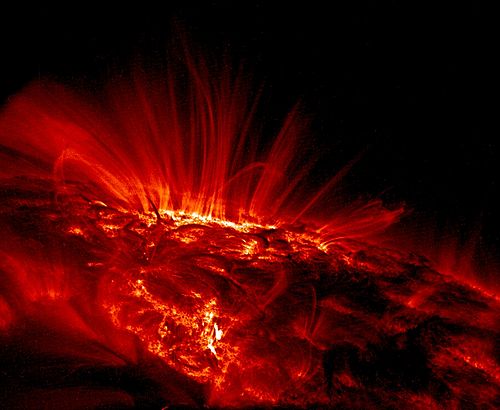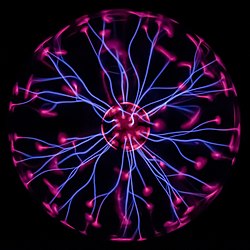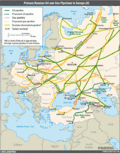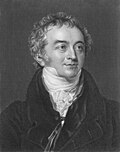Portal:Energy
| Main page | New articles & Tasks |
 The Energy Portal Welcome to Wikipedia's Energy portal, your gateway to energy. This portal is aimed at giving you access to all energy related topics in all of its forms.
|
Page contents: Selected article • Selected image • Selected biography • Did you know? • General images • Quotations • Related portals • Wikiprojects • Major topics • Categories • Help • Associated Wikimedia |
Introduction
Energy (from Ancient Greek ἐνέργεια (enérgeia) 'activity') is the quantitative property that is transferred to a body or to a physical system, recognizable in the performance of work and in the form of heat and light. Energy is a conserved quantity—the law of conservation of energy states that energy can be converted in form, but not created or destroyed. The unit of measurement for energy in the International System of Units (SI) is the joule (J).
Forms of energy include the kinetic energy of a moving object, the potential energy stored by an object (for instance due to its position in a field), the elastic energy stored in a solid object, chemical energy associated with chemical reactions, the radiant energy carried by electromagnetic radiation, the internal energy contained within a thermodynamic system, and rest energy associated with an object's rest mass. These are not mutually exclusive.
All living organisms constantly take in and release energy. The Earth's climate and ecosystems processes are driven primarily by radiant energy from the sun. The energy industry provides the energy required for human civilization to function, which it obtains from energy resources such as fossil fuels, nuclear fuel, and renewable energy. (Full article...)
Selected article
Hoover Dam is a concrete arch-gravity dam in the Black Canyon of the Colorado River, on the border between the U.S. states of Nevada and Arizona. Constructed between 1931 and 1936, during the Great Depression, it was dedicated on September 30, 1935, by President Franklin D. Roosevelt. Its construction was the result of a massive effort involving thousands of workers, and cost over 100 lives. Bills passed by Congress during its construction referred to it as Hoover Dam (after President Herbert Hoover), but the Roosevelt administration named it Boulder Dam. In 1947, Congress restored the name Hoover Dam.
Hoover Dam impounds Lake Mead and is located near Boulder City, Nevada, a municipality originally constructed for workers on the construction project, about 30 mi (48 km) southeast of Las Vegas, Nevada. The dam's generators provide power for public and private utilities in Nevada, Arizona, and California. Hoover Dam is a major tourist attraction, with 7 million tourists a year. The heavily traveled U.S. Route 93 (US 93) ran along the dam's crest until October 2010, when the Hoover Dam Bypass opened. (Full article...)
Selected image

Photo credit: NASA/TRACE
Plasma being channeled by the magnetic field loops of a sunspot.
Did you know?

- The 1,222 km long Nordstream pipeline between Russia and the Germany is the world's longest underwater pipeline?
- Due to the vast quantity of coal burnt in fossil fuel power plants, they cause more radioactive contamination than nuclear power plants?
- Chinese energy policy includes using renewable energy for the rural electrification of 3.5 million households by 2010?
- The 354 MW SEGS solar power plant (pictured) in the Mojave Desert is the world's largest?
- Known reserves of petroleum are typically estimated at around 1.2 trillion barrels, or at 3.74 trillion barrels if oil sands are included?
- The concentration of the greenhouse gas carbon dioxide has increased from about 280 parts per million to about 380 ppm since the start of the Industrial Revolution. That's an increase of 35.71%. The estimated population of the world in 1750 was 791 Million people. The estimated population of the world on June 30th, 2007 was 6.6 Billion people. That's an increase of 734.39%.?
- In the 1990s Bougainville conflict, islanders cut off from oil supplies due to a blockade used coconut oil to fuel their vehicles?
- The Organization of the Petroleum Exporting Countries (OPEC) is considered a cartel by many observers?
Selected biography
Born in Texas, Hubbert studied geology, mathematics, and physics at the University of Chicago. He pursued his Ph.D. while working for the Amerada Petroleum Company, then worked for the Shell Oil Company from 1943 until 1964. On leaving Shell he became a senior research geophysicist for the United States Geological Survey until retiring in 1976. Hubbert was also a professor at Stanford University and at UC Berkeley.
Hubbert is most well-known for his studies on the capacities of oil fields and natural gas reserves. He predicted that, for any given geographical area, the rate of petroleum production over time would resemble a bell curve. At the 1956 meeting of the American Petroleum Institute, Hubbert predicted that United States petroleum production would peak in the late 1960s or early 1970s. He became famous when his prediction came true in 1970.
In 1974, Hubbert projected that global oil production would peak in 1995 "if current trends continue". Various subsequent predictions have been made by others as trends have fluctuated in the intervening years. Hubbert's theory, and its implications for the world economy, remain controversial.
In the news
- 30 April 2025 – Ukraine–United States relations
- The United States and Ukraine sign the Ukraine–United States Mineral Resources Agreement to share profits from the future sales of Ukraine's mineral and energy reserves. (BBC News)
General images
Quotations
- "In recent years, new nations have entered enthusiastically into industrial production, thereby increasing their energy needs. This has led to an unprecedented race for available resources. Meanwhile, some parts of the planet remain backward and development is effectively blocked, partly because of the rise in energy prices. What will happen to those peoples?" – Pope Benedict XVI, 2007
- "In order to prevent the harmful consequences that crude oil price volatility is having on the well-being of our people, it is urgent that we convene a World Leaders Summit to present alternative solutions to this serious problem, which could quite possibly be a significant shock to the prosperity of developing nations." – Leonel Fernández, 2005
Related portals
WikiProjects
WikiProjects connected with energy:
Other WikiProjects that may be of interest:
Major topics
Major categories
National energy supply, use & conservation
National electricity sector
Politics, economics, environment
- Climate change
- Energy conservation
- Energy economics
- Energy crises
- Energy development
- Energy policy
- Peak oil
Energy sources
- Fuels
- Biofuels
- Fossil fuels
- Fusion power
- Nuclear technology
- Renewable energy
- Energy conversion
- Electric power
- Energy storage
Energy-related design
Scientific usage
Help

Puzzled by energy?
Can't answer your question?
Don't understand the answer?
- Ask at the reference desk
- Read the Wikipedia help pages
For further ideas, to leave a comment, or to learn how you can help improve and update this portal, see the talk page.
Associated Wikimedia
The following Wikimedia Foundation sister projects provide more on this subject:
-
 Commons
Commons
Free media repository -
 Wikibooks
Wikibooks
Free textbooks and manuals -
 Wikidata
Wikidata
Free knowledge base -
 Wikinews
Wikinews
Free-content news -
 Wikiquote
Wikiquote
Collection of quotations -
 Wikisource
Wikisource
Free-content library -
 Wikiversity
Wikiversity
Free learning tools -
 Wiktionary
Wiktionary
Dictionary and thesaurus
-

-

-

-

-
Random portal














































































































































































